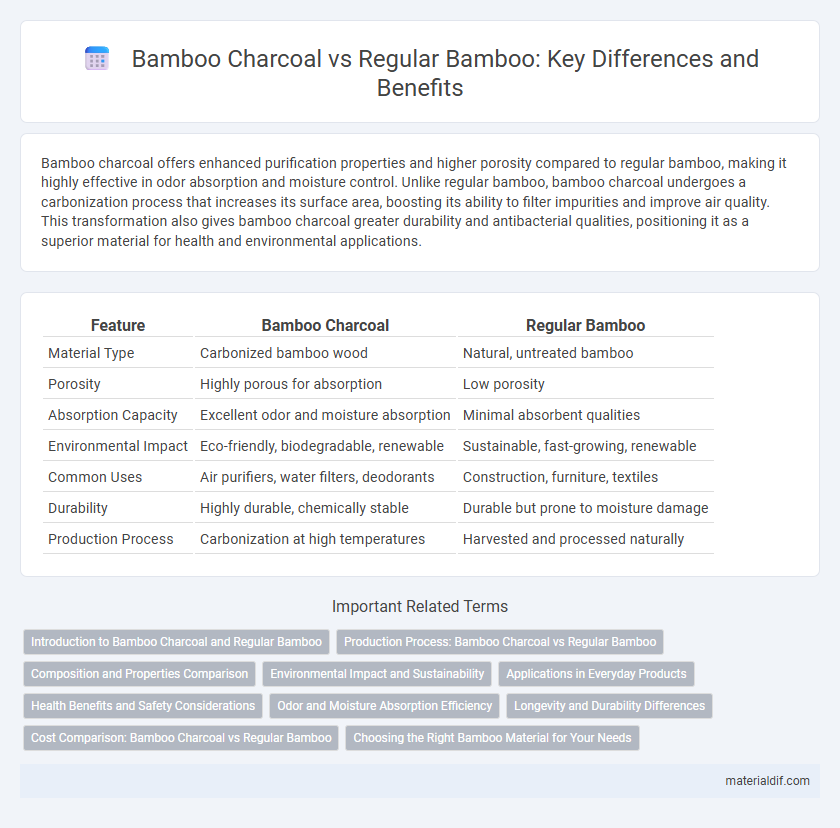Bamboo charcoal offers enhanced purification properties and higher porosity compared to regular bamboo, making it highly effective in odor absorption and moisture control. Unlike regular bamboo, bamboo charcoal undergoes a carbonization process that increases its surface area, boosting its ability to filter impurities and improve air quality. This transformation also gives bamboo charcoal greater durability and antibacterial qualities, positioning it as a superior material for health and environmental applications.
Table of Comparison
| Feature | Bamboo Charcoal | Regular Bamboo |
|---|---|---|
| Material Type | Carbonized bamboo wood | Natural, untreated bamboo |
| Porosity | Highly porous for absorption | Low porosity |
| Absorption Capacity | Excellent odor and moisture absorption | Minimal absorbent qualities |
| Environmental Impact | Eco-friendly, biodegradable, renewable | Sustainable, fast-growing, renewable |
| Common Uses | Air purifiers, water filters, deodorants | Construction, furniture, textiles |
| Durability | Highly durable, chemically stable | Durable but prone to moisture damage |
| Production Process | Carbonization at high temperatures | Harvested and processed naturally |
Introduction to Bamboo Charcoal and Regular Bamboo
Bamboo charcoal is a porous, black material produced by pyrolyzing regular bamboo at high temperatures, enhancing its absorption and deodorizing properties. Regular bamboo, a fast-growing grass species, is primarily valued for its strength, sustainability, and versatility in construction, textiles, and crafts. Bamboo charcoal's unique molecular structure makes it highly effective for air purification, water filtration, and soil improvement compared to untreated bamboo.
Production Process: Bamboo Charcoal vs Regular Bamboo
Bamboo charcoal undergoes a high-temperature pyrolysis process in a low-oxygen environment, removing moisture and volatile compounds to create a porous, carbon-rich material ideal for filtration and soil enhancement. In contrast, regular bamboo is harvested and processed primarily for construction, crafting, or textile production, involving cutting, drying, and sometimes chemical treatment without significant thermal alteration. The distinct production methods result in bamboo charcoal's unique structural properties, setting it apart from untreated bamboo in functional applications.
Composition and Properties Comparison
Bamboo charcoal is produced by pyrolyzing regular bamboo at high temperatures, resulting in a porous structure rich in carbon, minerals, and trace elements that enhance its adsorptive and deodorizing properties. Regular bamboo primarily consists of cellulose, hemicellulose, and lignin, providing mechanical strength and flexibility, but lacks the high surface area and chemical reactivity found in bamboo charcoal. The distinct composition of bamboo charcoal, with increased carbon content and porosity, makes it ideal for filtration, absorption, and antibacterial applications compared to the structural and ecological uses of raw bamboo.
Environmental Impact and Sustainability
Bamboo charcoal offers significant environmental benefits over regular bamboo by utilizing biomass waste through pyrolysis, reducing landfill waste and producing a natural, porous material that aids in air and water purification. Regular bamboo cultivation remains highly sustainable due to its rapid growth rate and ability to sequester carbon dioxide, but it requires careful management to prevent soil depletion and habitat disruption. The production of bamboo charcoal enhances sustainability by creating a valuable byproduct from bamboo residues, promoting circular economy practices and reducing reliance on fossil fuels.
Applications in Everyday Products
Bamboo charcoal is widely used in air purifiers, odor absorbers, and skincare products due to its highly porous structure that traps toxins and moisture effectively. Regular bamboo finds application in sustainable construction, furniture, and textiles because of its rapid growth and strong, lightweight fibers. The choice between bamboo charcoal and regular bamboo depends on whether the product requires filtration and absorption properties or structural durability and flexibility.
Health Benefits and Safety Considerations
Bamboo charcoal offers enhanced health benefits compared to regular bamboo due to its porous structure that absorbs toxins, odors, and moisture, promoting cleaner air and improved respiratory health. Unlike raw bamboo, bamboo charcoal is also antimicrobial, reducing bacteria and mites, which supports a safer environment, especially for allergy sufferers. Safety considerations include ensuring bamboo charcoal products are properly processed to avoid inhalation of fine dust particles that can irritate the respiratory tract.
Odor and Moisture Absorption Efficiency
Bamboo charcoal exhibits superior odor elimination and moisture absorption compared to regular bamboo, making it highly effective in air purification and humidity control. Its porous structure allows for enhanced adsorption of odors and excess moisture, outperforming the natural fibers of untreated bamboo. As a result, bamboo charcoal serves as an efficient, eco-friendly solution for maintaining fresher, drier environments.
Longevity and Durability Differences
Bamboo charcoal exhibits superior longevity and durability compared to regular bamboo due to its carbonized structure, which enhances resistance to moisture, pests, and decay. Regular bamboo, while naturally strong, is prone to degradation over time when exposed to environmental elements without treatment. Bamboo charcoal's porous composition also helps maintain structural integrity and extends functional lifespan in various applications.
Cost Comparison: Bamboo Charcoal vs Regular Bamboo
Bamboo charcoal typically costs more than regular bamboo due to the extensive processing required to produce high-quality carbonized material. Regular bamboo remains more affordable, making it suitable for construction, furniture, and crafts where carbonization is unnecessary. The price difference reflects the added value of bamboo charcoal's enhanced absorption properties and durability, which justify its premium cost in specialized applications.
Choosing the Right Bamboo Material for Your Needs
Bamboo charcoal offers superior odor absorption, moisture control, and antibacterial properties compared to regular bamboo, making it ideal for air purifiers and deodorizing products. Regular bamboo excels in strength, flexibility, and sustainability, making it a preferred choice for furniture, flooring, and construction materials. Selecting the right bamboo material depends on your specific needs, with bamboo charcoal suited for purification and hygiene applications, while regular bamboo is better for structural and decorative uses.
Bamboo charcoal vs Regular bamboo Infographic

 materialdif.com
materialdif.com